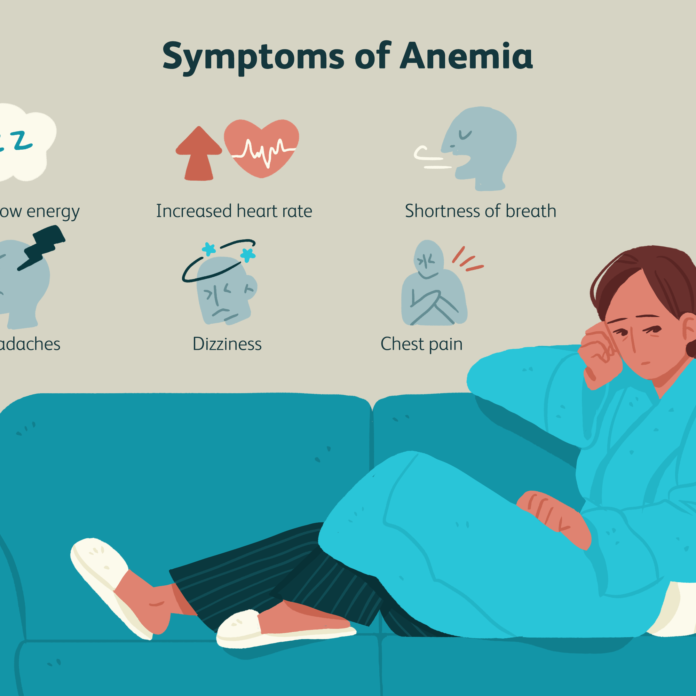According to the World Health Organization, anemia is a condition in which the number of red blood cells or their oxygen-carrying capacity is insufficient. There are many different types of anemia, each with its own symptoms and causes.
If you’re curious about anemia and want to learn more, read on for a comprehensive guide to the condition.
What are the symptoms of anemia?
The symptoms of anemia can vary depending on the type and severity of the condition. In general, however, anemic individuals may experience the following:
- Fatigue– This is one of the most common symptoms of anemia, and can be very debilitating.
- Pale skin– This occurs when there aren’t enough red blood cells to carry oxygen throughout the body.
- Shortness of breath– This occurs when the heart has to work harder to pump oxygen-rich blood to the body.
- Dizziness– This is another common symptom, and can be caused by low blood pressure.
- Heart palpitations: These occur when the heart is trying to make up for the lack of oxygen in the blood.
- Headaches– These can be caused by the lack of oxygen in the brain.
- Cold hands and feet– This occurs when there isn’t enough blood flow to the extremities.
If you’re experiencing any of these symptoms, it’s important to see a doctor so that they can run the appropriate tests to diagnose your condition.
What causes anemia?
There are many different causes of anemia, and the exact cause can vary depending on the type of anemia you have. Some of the most common causes include:
- Iron deficiency– This is the most common type of anemia, and it occurs when there is not enough iron in the body to produce red blood cells. Iron deficiency can be caused by blood loss, pregnancy, or a diet that is low in iron.
- Vitamin deficiency– Certain vitamins, such as vitamin B12 and folate, are essential for the production of red blood cells. A deficiency in either of these vitamins can lead to anemia.
- Chronic illness– Certain chronic illnesses, such as cancer or kidney disease, can cause anemia by interfering with the body’s ability to produce red blood cells. When anemia is caused by a chronic illness, it is referred to as “secondary anemia.”
What are the treatments for anemia?
Anemia can be a serious condition, so it’s important to see a doctor if you think you may be affected. The treatment for anemia will vary depending on the underlying cause, but may include:
- Iron supplements– If your anemia is due to iron deficiency, you will likely be prescribed iron supplements to help increase your iron levels.
- Vitamin supplements– If your anemia is due to a vitamin deficiency, you will likely be prescribed vitamin supplements to help correct the deficiency.
- Blood transfusions– In some cases, anemia may be severe enough to require a blood transfusion. This is a procedure in which red blood cells are taken from a donor and transfused into the anemic individual.
- Chronic illness treatment– If your anemia is due to a chronic illness, treatment will focus on managing the underlying condition. This may include medication, surgery, or lifestyle changes.
Who is at risk for anemia?
There are several groups of people who are at increased risk for anemia, including:
- Women of childbearing age– This is because women lose blood during menstruation, and also need extra iron during pregnancy.
- Children– Children are at increased risk for iron deficiency anemia due to their high iron needs during growth and development.
- Vegetarians– Vegetarians may be at risk for anemia due to their diets being low in iron. They may also be at risk for vitamin B12 deficiency anemia if they do not eat enough foods that are fortified with this vitamin.
- Older adults– Older adults are at increased risk for anemia because the body’s ability to absorb iron decreases with age. They may also be at risk for other causes of anemia, such as chronic illnesses.
- People with chronic illnesses– People with chronic illnesses, such as cancer or kidney disease, are at increased risk for anemia because these conditions can interfere with the body’s ability to produce red blood cells.
How can I prevent anemia?
Anemia can often be prevented by eating a healthy diet that includes plenty of iron-rich foods. If you’re at risk for iron deficiency anemia, your doctor may also recommend taking iron supplements.
You can also help prevent anemia by avoiding blood loss. If you have a condition that increases your risk of bleeding, such as heavy menstrual periods or ulcers, be sure to talk to your doctor about ways to manage the condition and reduce your risk of anemia.











